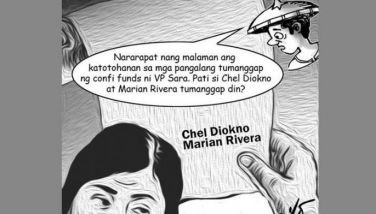Saving the world

I was invited to a conference in Cebu for USAID’s Project Inspire and was indeed inspired by how NGOs have helped Indigenous People (IPs), fisherfolk and forest dwellers through the Gerry Roxas Foundation, the project implementors.
The project centers on communities that practice sustainable fishing, have sustainable honey production, harvest coffee from forested areas, cacao, rice and even abaca production.
You can guess what we had for mid-morning snacks: champurrado using the rice and cacao brought by the grantees, coffee from Bukidnon and honey from Palawan. The champurrado was topped with fried tabagak fish sourced from sustainable fishing areas. It was a pleasure partaking of this snack which was heavy enough to qualify as brunch. What was more filling and heartwarming is the thought that all these food come from sustainable sources.
I spoke about access to markets through ECHOstore which we have been doing for the last 15 years – connecting producers to consumers in the shortest supply chain possible. Another speaker was Henry James Sison of Agro Digital PH, who does business-to-business or B2B for vegetable farmers to supermarkets; he cuts the layers from 12 to just four – the farmer, the aggregator, the retailer and the consumer. Slow by slow, as we say. One farmer at a time, one supermarket chain at a time.
It was a feel good place because everyone had the mindset of “saving the world.” How to get goods through sustainable sources, have direct to market access and the pushing of value to the farmer or fisherfolk than to consolidators and trading posts. Henry mentioned that community relations is key. One can buy the cheapest produce from a trading post or bagsakan and never get to know the farmer who actually plants the seeds. Henry uses information technology to see what farmers grow and when they are ready for harvest. He calls this his “God’s view” of the vegetable sources around the country. He can look for another source in case a place is hit by typhoon and is not able to harvest. And that is how we can let our farmers thrive – if everyone knows where the vegetables are and how to take them from Point A to Point B. But it needs an entrepreneur who has a heart to do community relations and engage farmers or producers more deeply than just a “one off” transaction.
After the speakers’ parts, Henry and I left for the airport to catch our flight back to Manila only to wait for another four hours due to maintenance delays. And that gave us time to share ideas about growing organic food and why Good Agricultural Practices or GAP is not all that bad. People like Henry are few and far between. So the flight delay was well worth the wait as we talked about how farmers and consumers can work better together, we two trying to solve the food security challenge.
We both lament the rise in cancer cases brought about by consumption of modern food and we share how difficult it is to buy food if you do not know your farmer.
In a microcosm, there are people who grow their own food and just are happy doing it. I visited a security guard in one of our farms and he happily offered me a native chicken to bring home. I asked for two organic eggs and promised to come back for the whole chicken another time. This security guard was making a plot to plant eggplants and other vegetables when we came to visit. He had many chickens going around the small guardhouse area, and he also had a malunggay tree with leaves and pods (you can eat both). He actually grows his own food and has a diet of chicken every so often.
Our caretaker at the other farm meanwhile gets eggs, bananas, papaya, bamboo shoots and other edible vegetables just by foraging around. The key to food security is really planting around your backyard and knowing you never have to go to market for chicken or vegetables.
But man is never satisfied. The guards who have chickens roaming around look for meat. The meat eaters look for fish or seafood. In the meantime, people in the city settle for instant noodles and expensive rice or bread.
Henry and I bought lechon at the airport but he could not reconcile the retail price with how much he sells pork at wholesale prices. That is how life is. You can produce pigs but it takes another skill to convert it to a lechon or roasted pig. The value addition is tremendous.
Just like coffee. You can buy green beans, roast them and then learn how to brew. But you can also just buy an expensive cup of coffee at a famous shop and not complain.
I look back at our conference attendees and cannot help but smile. These grantees are just so lucky to be supported in their desire to support biodiversity and sustainability – two words we must imbibe and, as they say, “walk the talk.”
So, in this conference room I found people who everyday just do little things to save the world – the marine biodiversity, the forests, our indigenous communities and more. And after meeting more like-minded people like Henry, we just carry on. Henry switched from a high-paying corporate OFW job to come home and be a farmer. But using his tech skills, he helps other farmers. And all because he realized that he seemed successful but has never given anything back to society.
How about you, what’s your talent or skill that can change the world? Everyone has a gift, even the security guard who raises chickens for his own food. Find out what yours is and help save the world.
- Latest
- Trending



























